Friday and Saturday 9th/10th June – Pidi Island
We decided to stay on in Pidi for a few days because it’s nice and we’re in no great hurry to go anywhere else. Several of the yachts are moving on to Indonesia’s Natuna Islands as part of the rally and Deb and Bruce are heading that way too so they called on us in the morning to say goodbye before they left. It had been great spending time with them and we’ll miss their company but we’re going to stay in touch and will be looking them up when we get to Queensland.
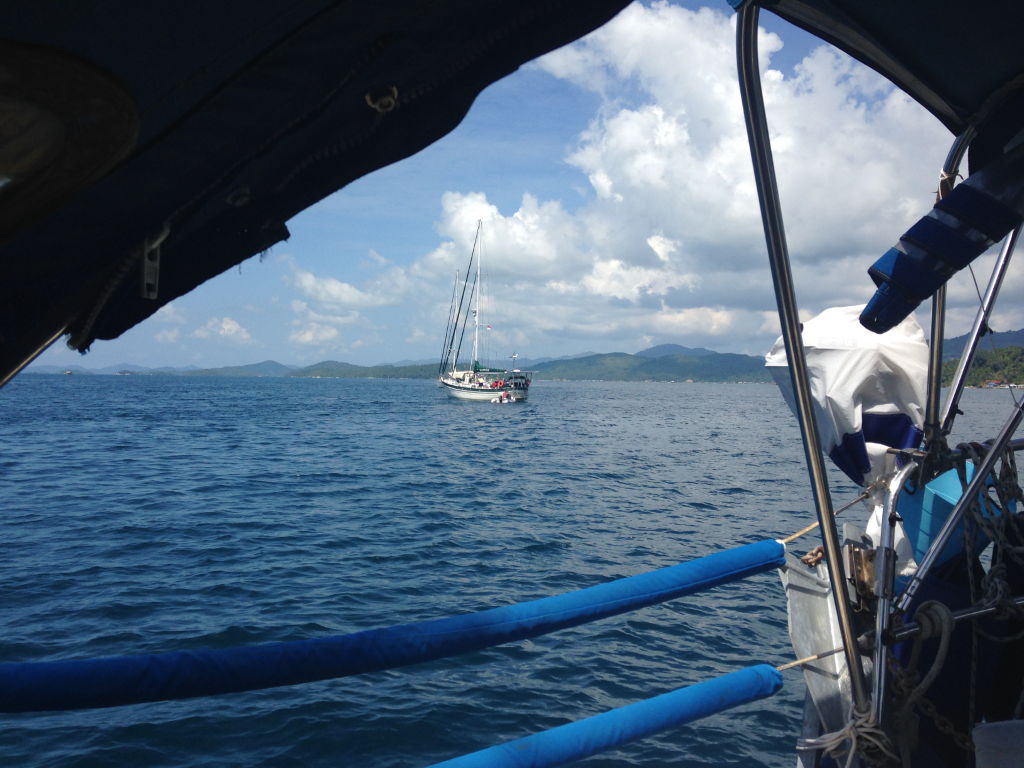
Due to the time difference we were able to listen to the UK general election results as they came in. I’ve never been able to do that before and I’m glad I did for this one because it held quite a few shocks and surprises, and the commentary was fascinating even though we weren’t impressed with the result. Once all the boats had left we were completely alone in the bay. The staff from the barbecue had all left and from what we could tell, there was just a caretaker on the tiny island. After the noise and ‘busyness’ of Terempa, the prospect of a couple of days spent reading, cooking, listening to the radio and swimming and snorkelling when exploring in the dinghy was a blissful thought. Returning from one of these excursions, however, the propeller on the dinghy hit something in the water and broke it, so Paul had to row us back in quite a strong current. While he got on with fixing that, I had a go at baking some bread because we had none having rejected what was on offer in Tarempa. I just googled something like ‘simple bread recipe’ and followed it exactly, not really expecting much success but we were pleasantly surprised with the result – an improvement on the sugary doughy loaves we’d been having anyway. I also made a roasted vegetable sauce for pasta with the veggies we’d bought from the market. It will be a long time until we do a ‘big’ convenience shop so I’m going to have get creative and inventive with the options available. All good practice for future long passages in the South Pacific.
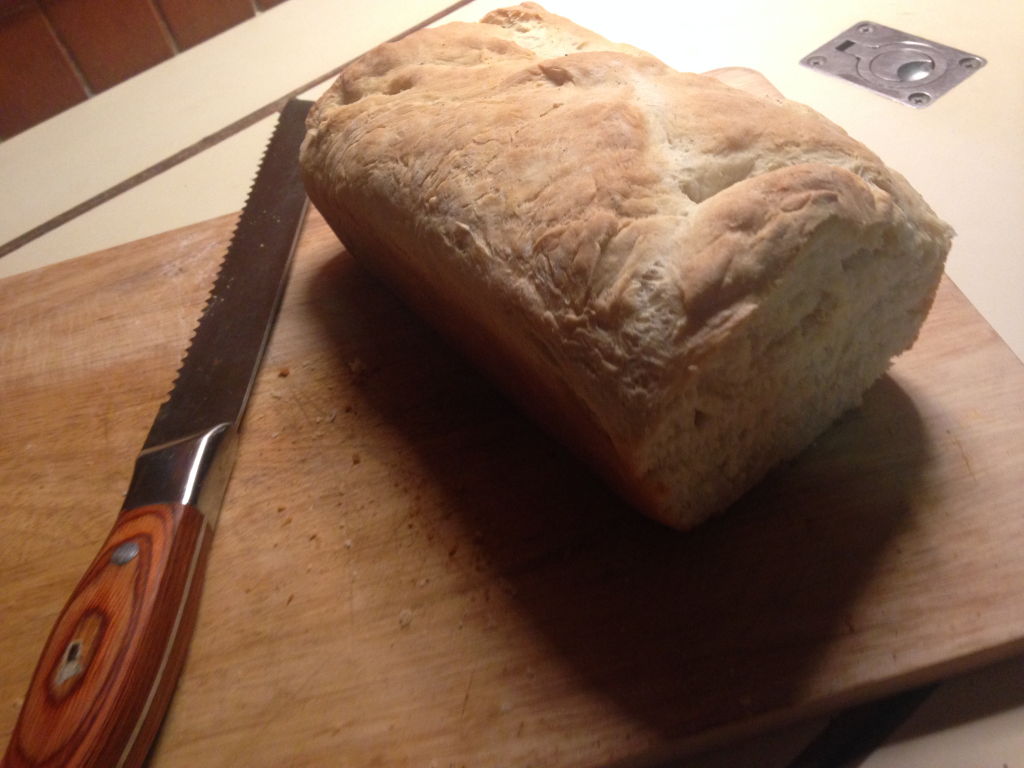
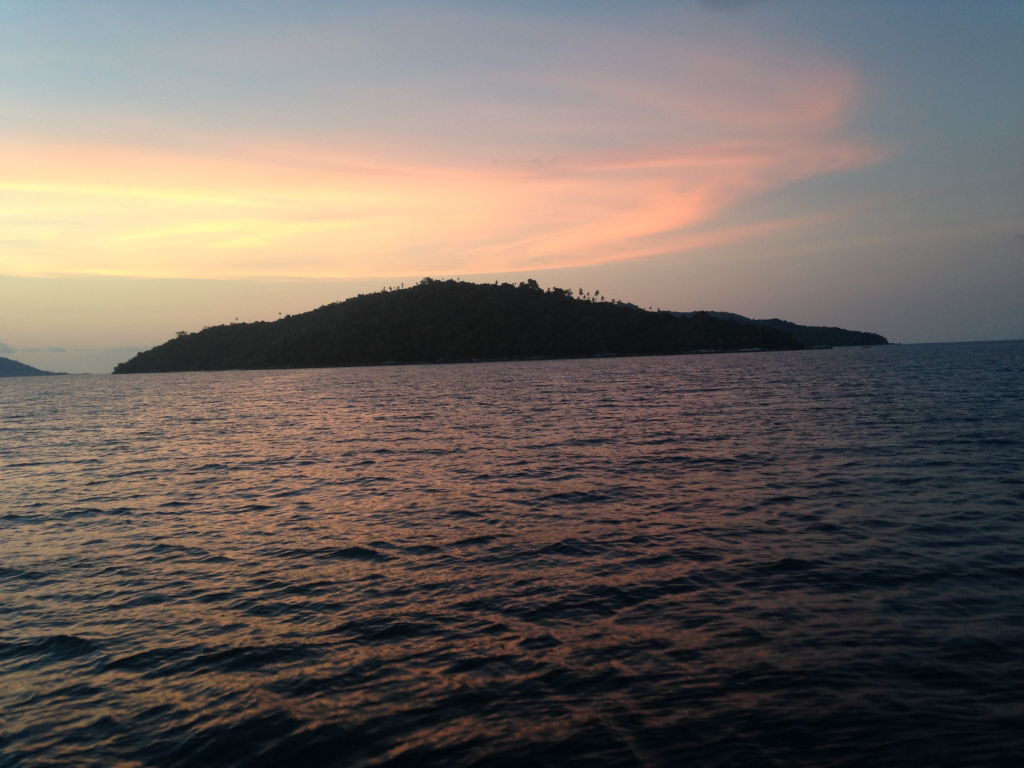
Sunday 11th June – Blue Starfish Bay
Paul told me he’d been puzzled by a sound very much like African drumbeats coming from the island during the night! All I’d heard when I woke up in the early hours was some mellow prayer songs drifting over from the larger island on the other side. They were at a pleasingly lower volume than those in Terempa. We had a visitor in the morning. A young local fisherman in a dugout canoe stopped by to say hello and admired the boat so much that Paul invited him on board. The language barrier meant conversation was scant but they managed a pleasant exchange with smiles, a few words and hand signals. He told us his name was Tommy and he gave Paul a fish but adamantly refused any payment for it. He sat in the cockpit watching Paul work on the broken propeller for ages. I was typing in the cabin but he wouldn’t come down for a look around because his clothes were wet. I would have loved to have taken a picture of him but didn’t in case it caused offence (a few people who just happened to be near something I wanted to photograph have covered their faces in case they are inadvertently in the picture) and sensing his shyness, I didn’t want to embarrass him by asking.
Our next place, Manda Riouw Darat was an hour away so when Paul had finished fixing the propeller we set off. Just as we had set the anchor, it began to rain heavily. We’d been waiting for this because having used up one full tank of water since leaving Puteri in May, Paul was keen to try collecting some rainwater up on the coach roof using a plastic sheet a tube and a funnel. The system needs some fine tuning but quite a bit of water ended up in the containers. He also lathered up with gel for a shower but typically the rain stopped at that point so he had to rinse it all off using the tank water. Again, all useful learning curves for long passages when water and fuel need to be conserved. It brightened up later and I was thrilled when Paul came back from a snorkelling trip to tell me he’d seen blue starfish and turtles.


Monday 12th June – On to Penjalin
It had been a very rocky night due to the huge swell from all the storms. Both of us, me in the V-berth and Paul in the cockpit, adopted the same strategy to maintain stability which was to lie across the width of the boat, with feet pressed firmly against the wooden sides. Sometime around 5 am it calmed down enough for us to get a solid sleep until 9 o’clock. Toast from homemade bread made for a tasty breakfast and then we went for a spin in the dinghy. All around and underneath us were the wonders of nature to admire and gasp at. Several white birds swooped down alarmingly near to us and screamed loudly when we approached rocks where presumably they had chicks or eggs to protect.
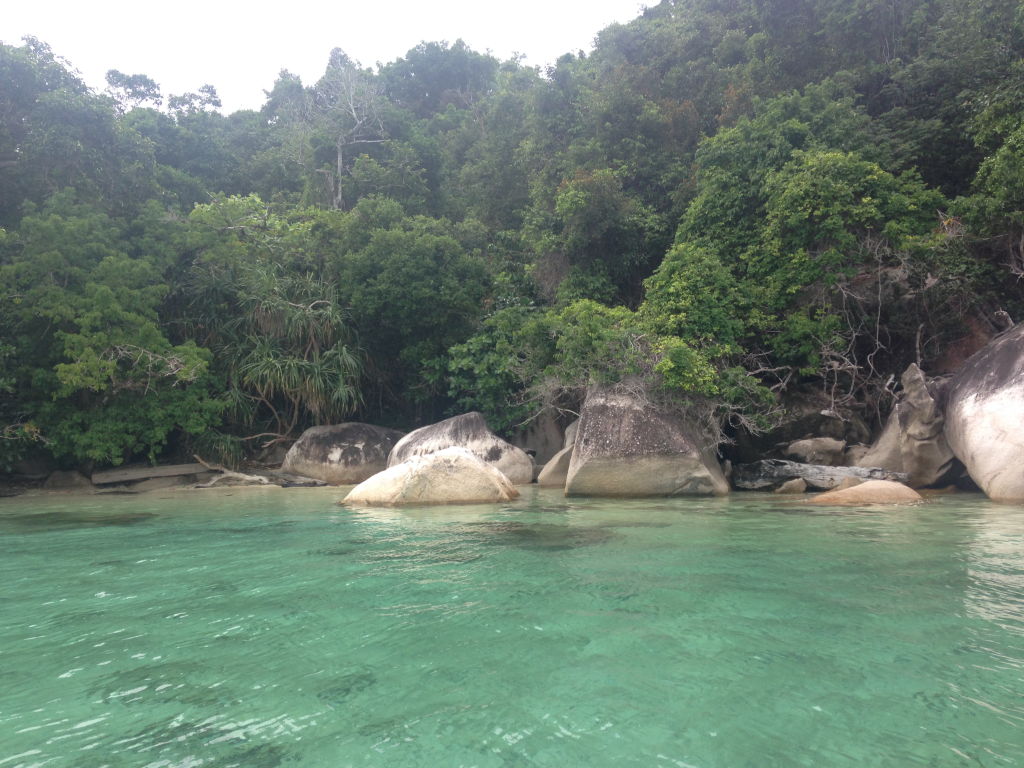
All types of coral could be seen in the crystal clear water. We don’t know the proper names for them so we tend to refer to them as ‘doughnuts’ or ‘teeth’ or ‘bones’ according to their shape. The fish darting amongst it were stripy, black, big, small, blue and yellow – it was like looking in an aquarium. We also saw turtles and sea snakes and I was thrilled to spot the blue starfish Paul had seen. They are quite big and their tentacles move very slowly and gracefully – such beautiful and unusual creatures.
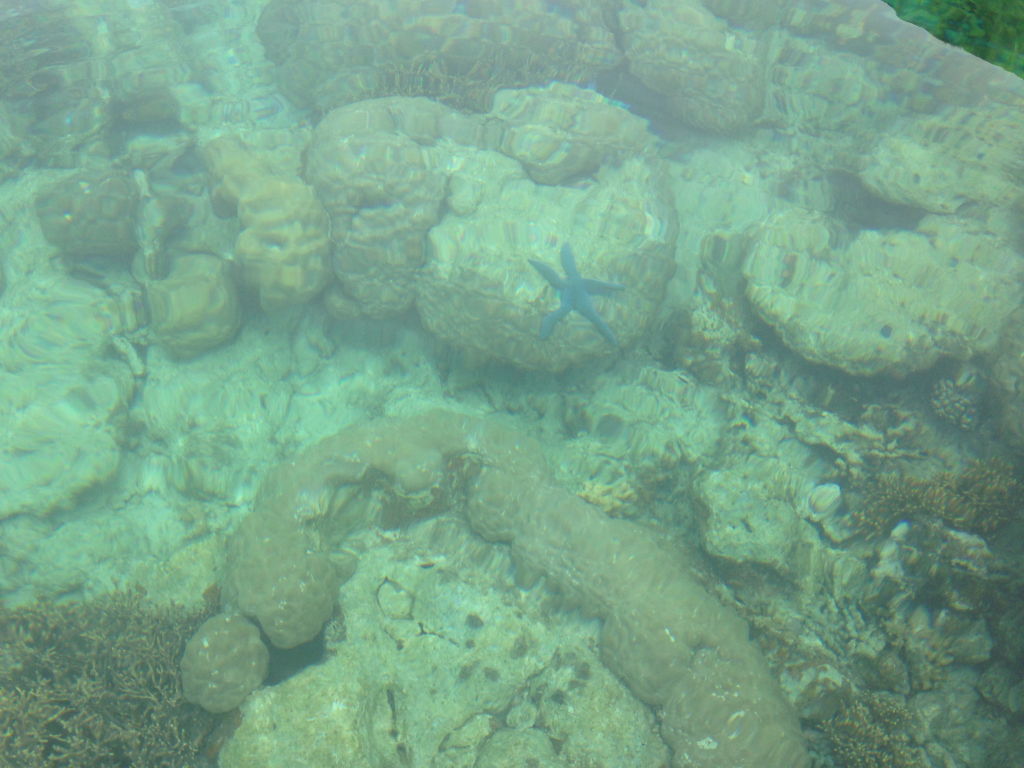
We beached the dinghy to take a look at the shore, and were sad to see all the rubbish that has accumulated on it. The amount of plastic bottles we’ve seen in the water or on the beaches is staggering and I fully support the efforts of organisations such as ‘Sky Ocean Rescue’ in their mission to clear the oceans and shores of plastic waste.
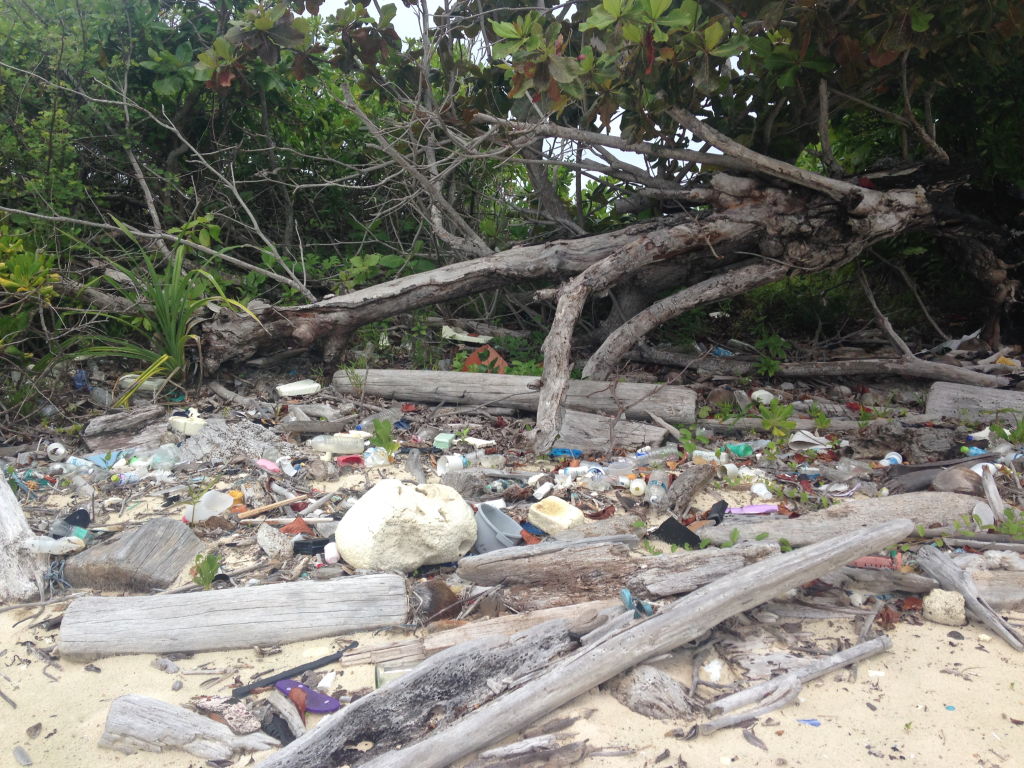
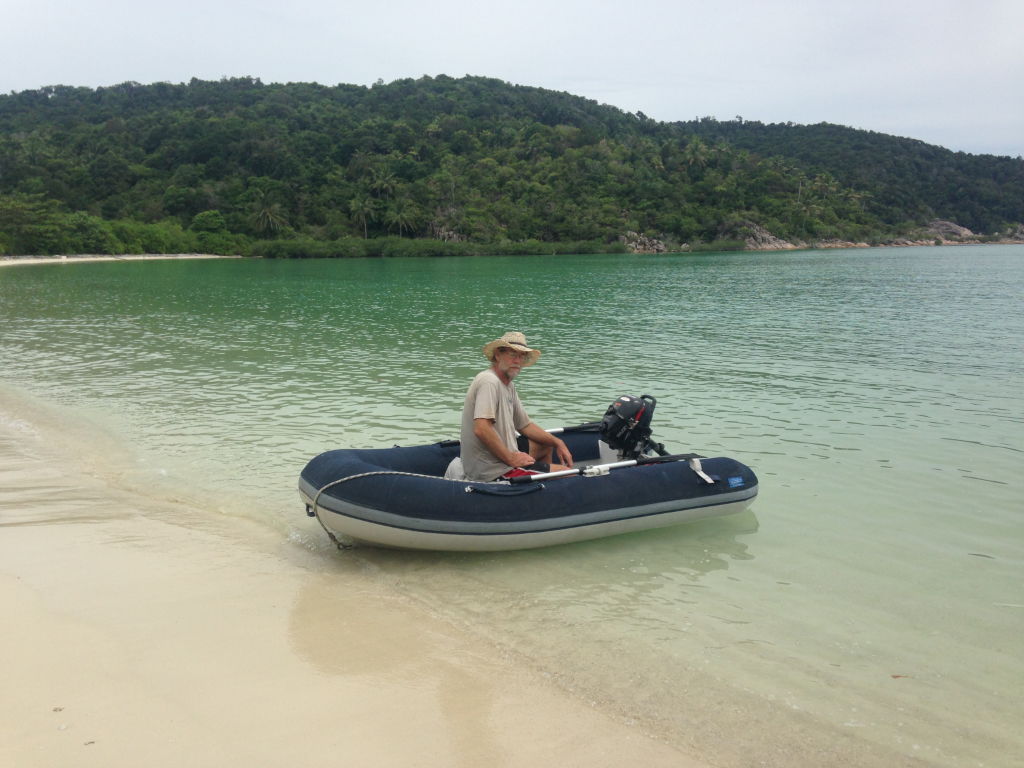
After a pleasant hour beach combing and snorkelling we set off for Penjalin Island and anchored there in 13 metres of water early in the afternoon. Finding a spot well clear of the coral was easy enough and it’s a lovely spot with a long, curved white sandy beach and the clear water we’ve come to expect in Anambas. Watching the sun sink behind the granite rocks and forested hills, it struck me that the land formation before us showed no sign of human intervention whatsoever, and this vista would have looked much the same throughout the preceding decades. I hope that continues.
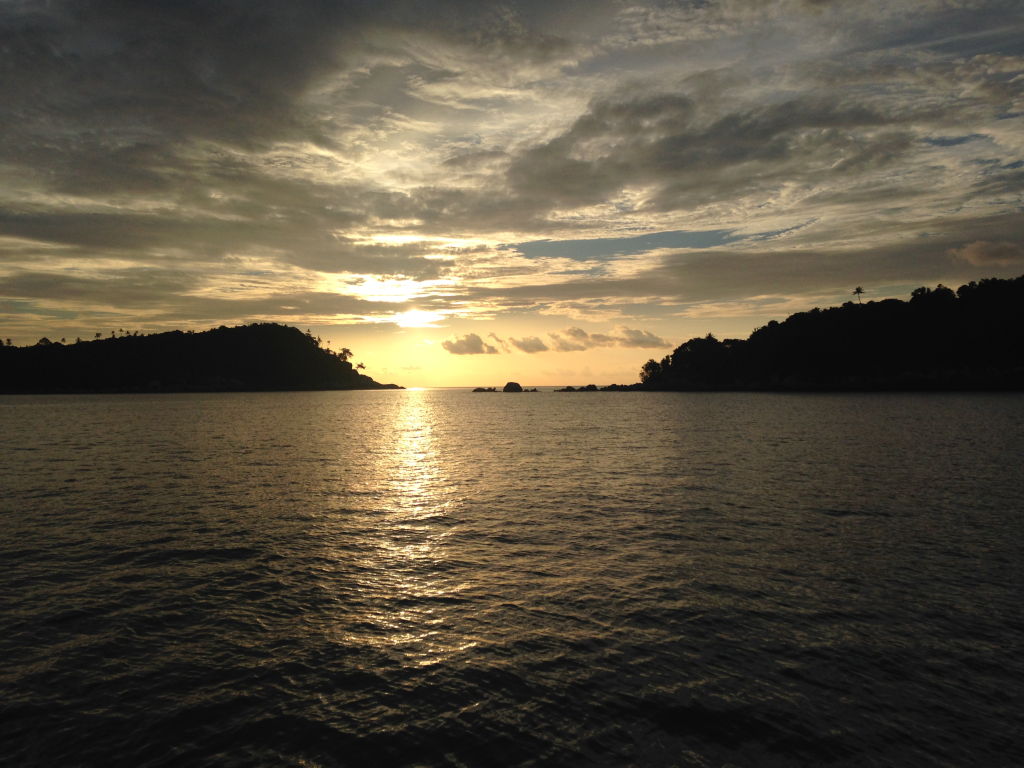
Tuesday 13th June – From Penjalin to Tenggiling
This morning I donned my new swimming cap (it reminded me of school swimming lessons but did a grand job of keeping hair out of my eyes and preventing my ears blocking with water) and went snorkelling with Paul. For an awe-inspiring hour I shared the habitat of a vast and stunning variety of fish, coral and anemones, watching snippets of their lives as they fed, swam, slithered and swayed in the water. The sea was clear, shallow enough to stand up in and warm – all ideal conditions for me as something of a nervous snorkeler. I’ll definitely do more. We left for the two hour passage to Tenggiling early in the afternoon. After a hot start, the wind strengthened sufficiently for Paul to put the headsail up and we made steady progress with it, arriving around 4pm to anchor in 14 metres of water. The bay is surrounded, cul-de-sac-style with forest and as we sat on the bow early in the evening we speculated about the tiny little house we could see on the shore. Straight out of fairy tale imagery, it had a well-tended garden, surrounded by thick forest, smoke coming out of a chimney, two cats, a gnarled old tree (well, ok it was a banana tree but you get the picture). There was also a boat parked near to it and some children’s playthings. Was it a home? Were they self-sufficient in a ‘Good Life’ kind of way? Or was it a holiday home? It made me wonder if it’s allowed to build a house wherever you fancy here, without the rigmarole of planning permission and mortgages etc.
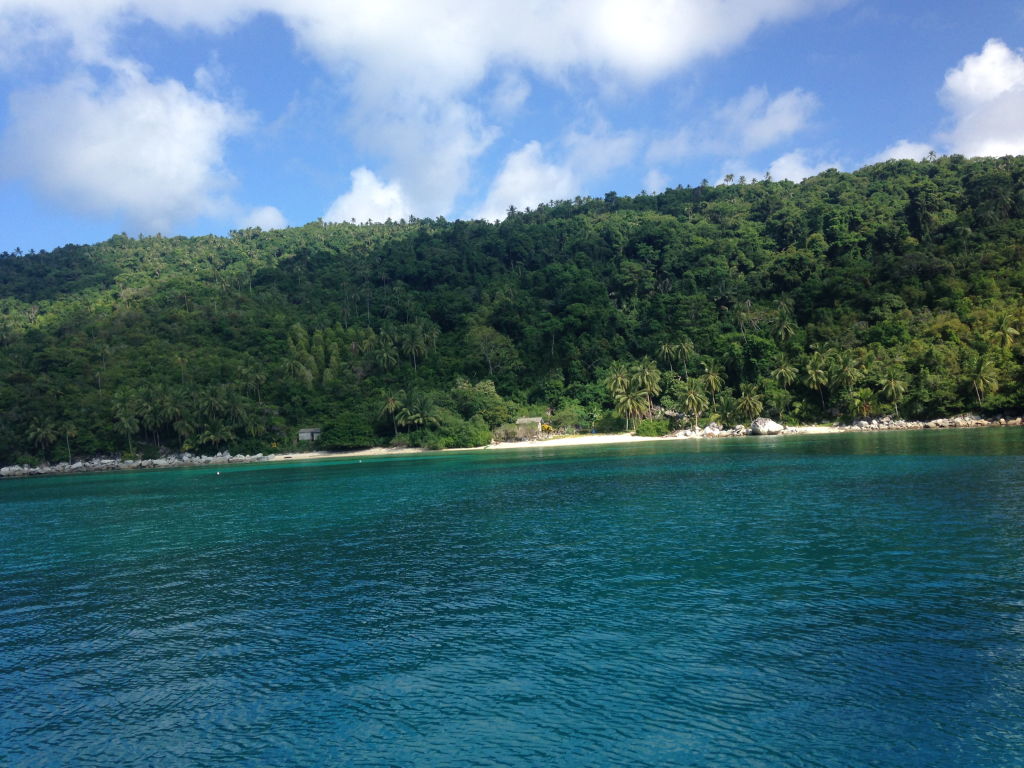
Wednesday 14th June Tenggeling to Mubur
The beautiful sunny morning we woke up to lasted for a couple of hours until Paul, returning from snorkelling said we had to prepare for a coming squall. I could see it in the distance, dark clouds with rain falling from them and what looked rather alarmingly like a spout at the bottom of one of them, bringing to mind visions of a huge twister transporting us away a la Wizard of Oz! The wind increased and when the rain came, Paul said he actually felt cold – for the first time since being in Asia. He’d been busy on the coach roof collecting rain water and we now have two large containers filled for emergencies. With rain water, and the watermaker, once it is fixed, we should have more than enough for our needs in The South Pacific. Squall over, we weighed anchor and were soon on our way to Mubur, another Anambas island to tick off the list and another beautiful (and empty) bay to spend the night in. Lots of coral on the sea bed here but we found a suitable spot to drop the anchor in 20 metres. For dinner, I made a roasted vegetable tart with more of the market vegetables, using aubergines, peppers, pumpkin and onions with sun-dried tomatoes (having no rolling pin I had to improvise using a glass bottle to roll the pastry). Paul’s efforts to bag a fish are still proving fruitless, or should that be fishless, but there’s always the next place which will be much better for fishing 😉
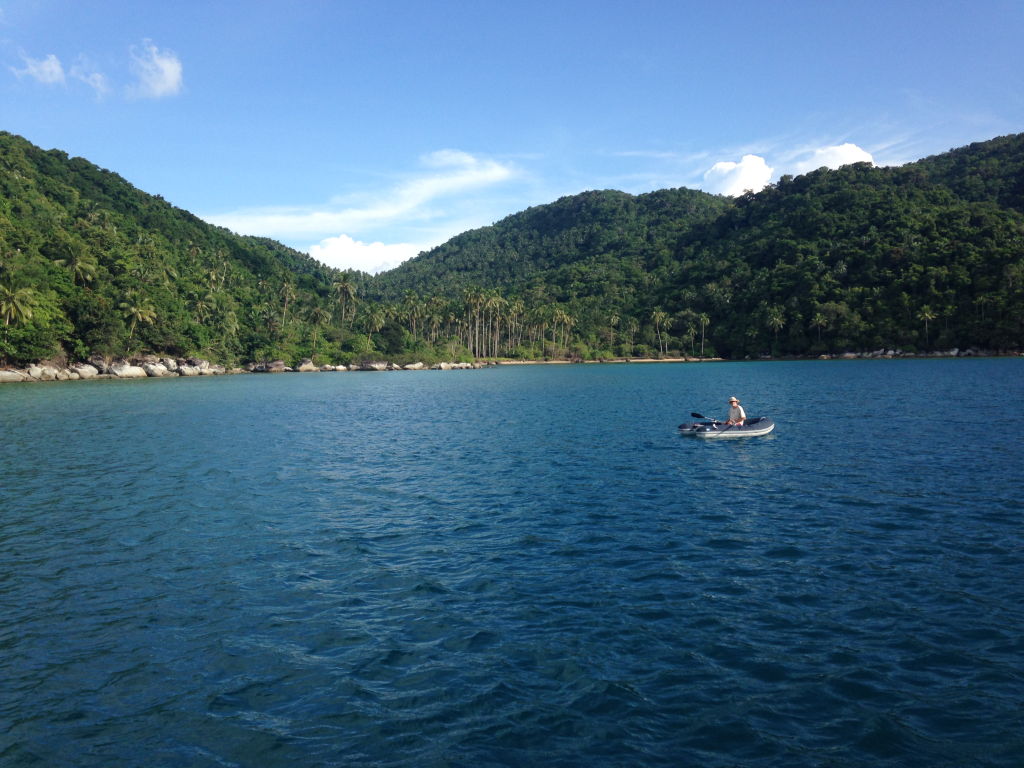
Thursday 15th June – Mubur and Terempa
During one of his anchor inspections in the early hours of the morning, Paul noticed three or four guys wading in the water near the beach, clearly collecting something. Later, both of us heard a noise we couldn’t identify. I said it sounded like hundreds of frogs croaking all at once, while Paul thought it was a pump or something else emanating from the boat. In the end we concluded that it was merely fish nibbling the hull, and it was quite a soothing noise to drift off back to sleep to. When we got up a couple of hours later, the guys were still adding to their haul. Huge sacks had been filled and piled next to their small boat on the sand. Was it clams or shrimps or seaweed? or were they clearing rubbish? It wasn’t until later, that we found out it was nothing more than sand! They’re probably collecting it to make cement or to sell for that purpose. The guide to The Anambas, produced by the captain of a catamaran a couple of years ago, mentioned that long-tailed macaques populated the beach at dusk but they hadn’t shown the previous evening. Chirrups and chattering sounds were coming from the trees opposite and I trained the binoculars on the branches for ages in case they were there but I didn’t even spot a bird!
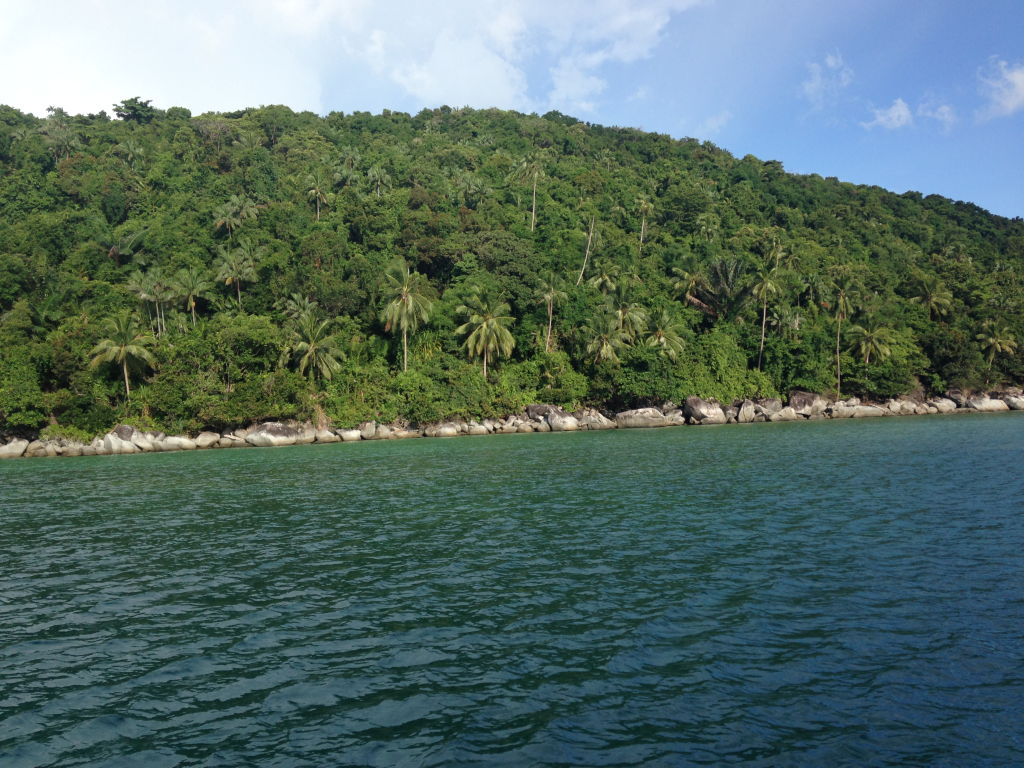
For a late breakfast, we had a juicy and very tasty fresh pineapple, washed down with lashings of local hot black coffee (well we had no ginger beer on board ;)). When the men on the beach left, we decided to dinghy over to investigate what the beach had to offer. There is no spectacular coral scene in the shallow water here, but the lush jungle, with its swaying palm and casuarina trees and leafy green ferns is just as striking. The beach was littered with the usual plastic bottles, carrier bags and polystyrene cases and several palm trees had toppled over into the sea, exposing large clumps of exposed roots. It was obvious where the men had been collecting sand – they had cut into the beach and extracted it in the manner of stone from a quarry. Some pics below show the peaceful and delightful Mubur.
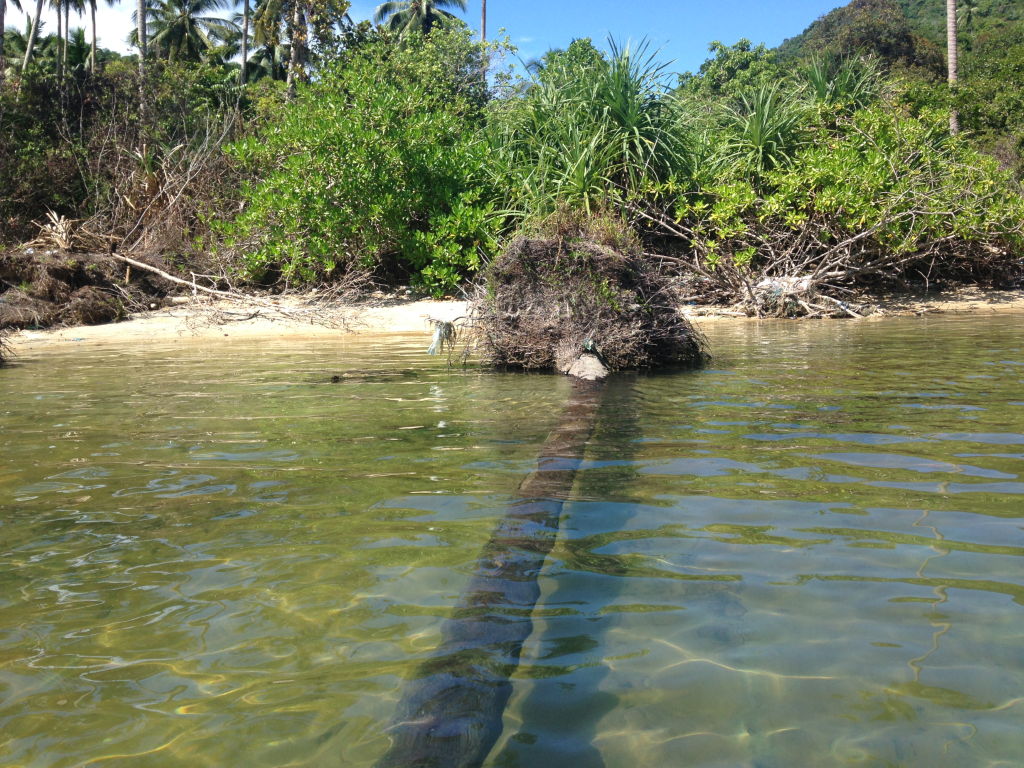
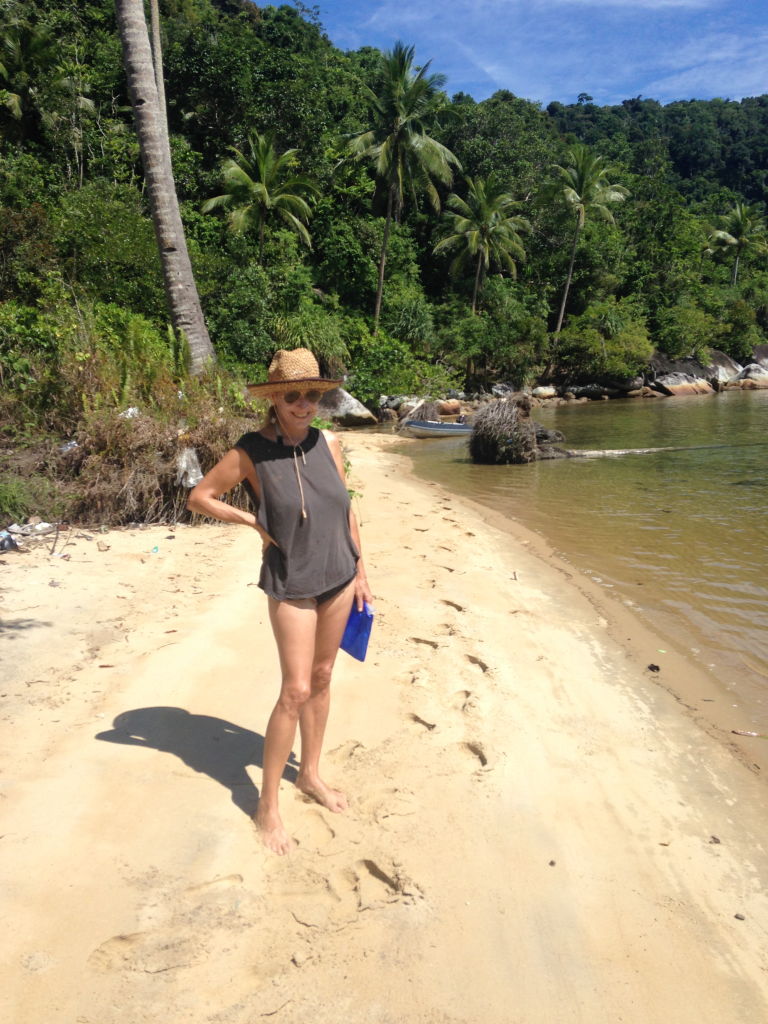
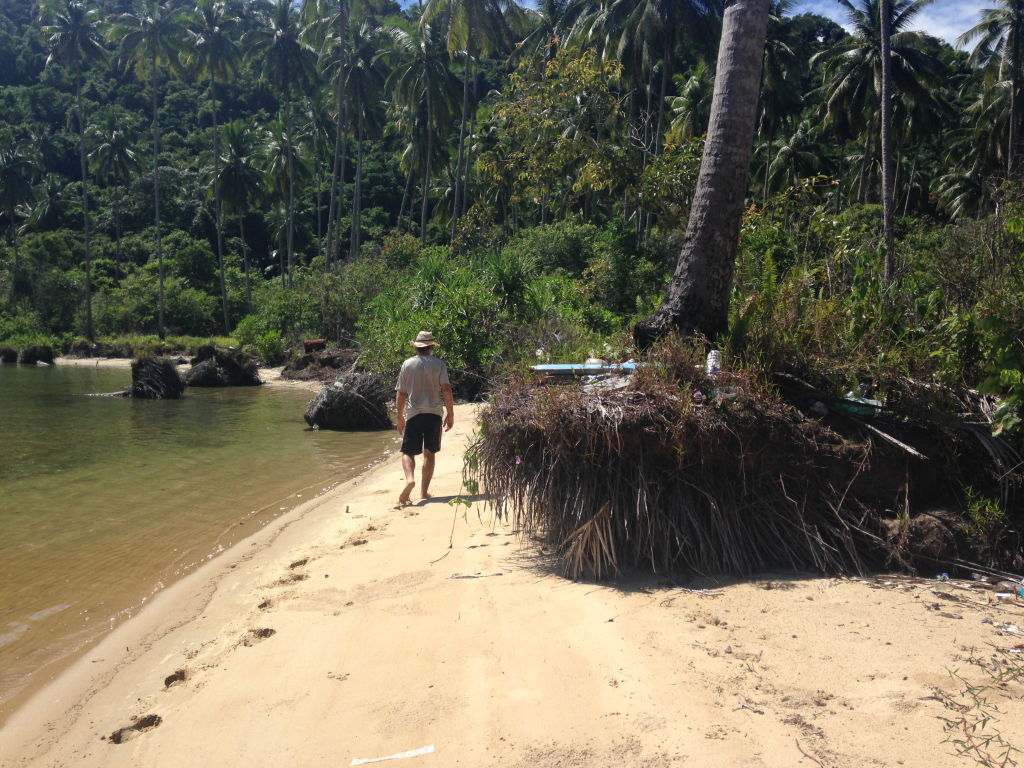
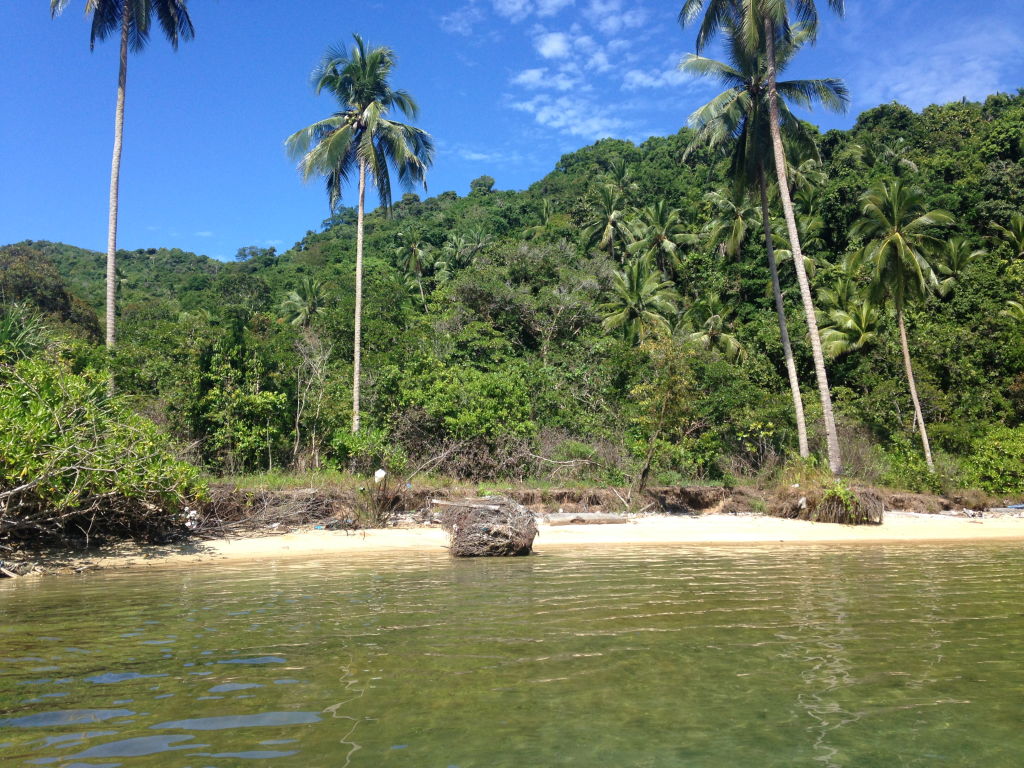
On the way back to the boat, the outboard, which had been problematic for a while refused to start at all. This would cause major hassle for us in Terempa, considering the number of trips back and forth to the village we were planning in order to provision for the next leg. It was taken apart bit by bit when we got back, each part examined before being put back together and it turned out to be the sparkplug. A quick break for lunch and we set off through the pass between Matak and Mubur for the return journey to Terempa. It was deserted in the harbour, and there was just one other boat behind us coming in, so we had more space in which to choose a spot and manoeuvre. We anchored in 24 metres, a little closer to the shore than previously, and we completed it a lot faster, too – although I couldn’t help feeling a bit concerned about the proximity of the coral (I guess it’s going to be an ever-present concern in coral reefs). Once ashore, we restocked with drinks and a few groceries but couldn’t see any salt on the shelves so Paul looked up the word on his phone when repeatedly saying ‘salt’ to a bemused-looking shopkeeper got us nowhere. His face lit up when Paul said ‘garam’, and he produced some for us from a pile of packets near the sacks of rice. Again, it struck me how we rarely have to ask for such things in the UK (except when asking which aisle certain products are located in). The higgledy-piggledy, disorganised shelves in the shop units here are charming in an old-fashioned way and tend to invite interaction – conversation even, in a way that supermarkets don’t. I wonder what the people from the village would make of a Tesco hypermarket!
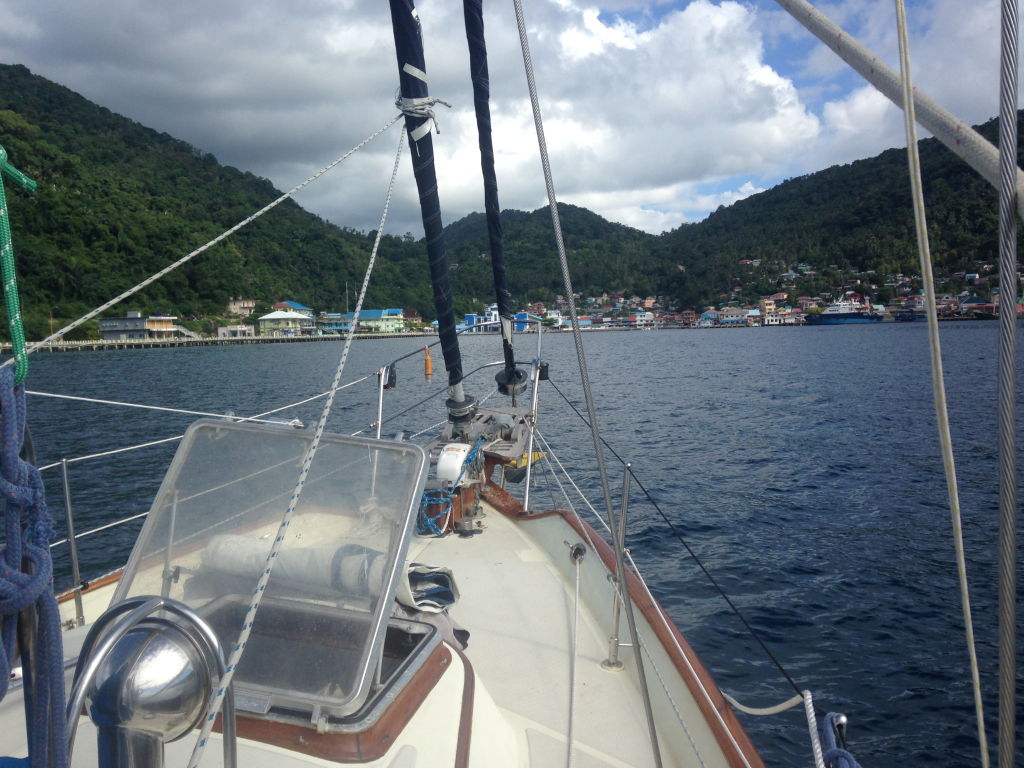
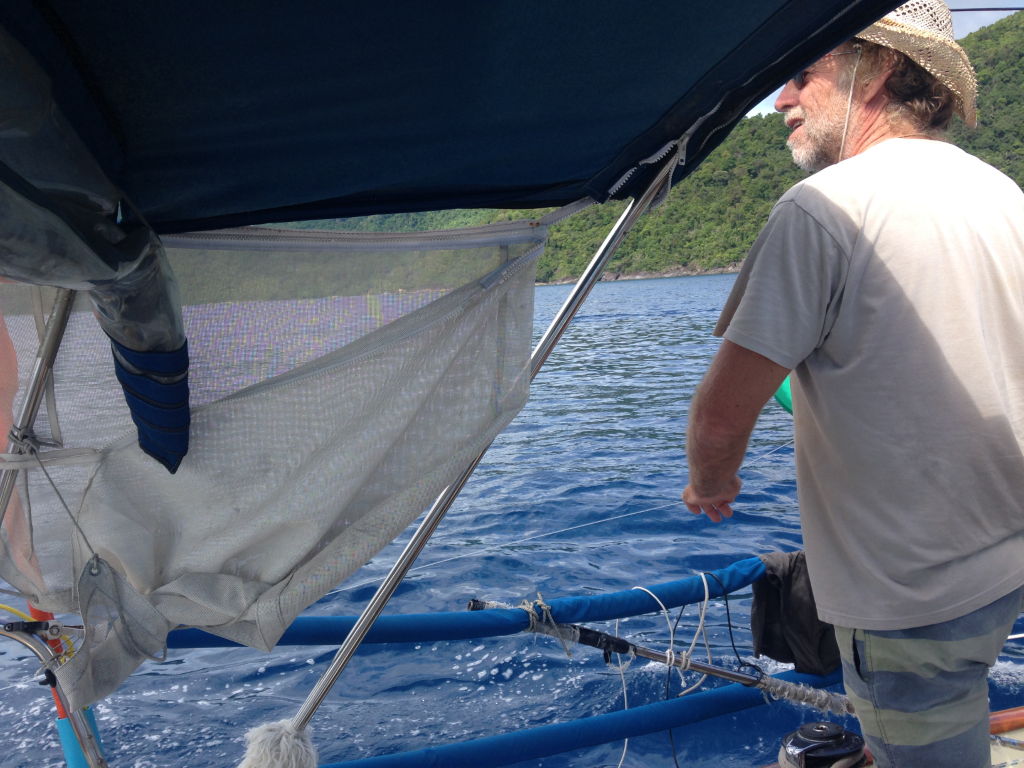

Loved reading this Kathy and well done on the bread, Lovely pics of a stunning area. x